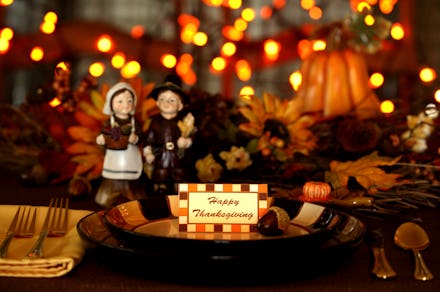The pandemic has given us a chance to rethink Thanksgiving altogether

Many of us have read the news stories urging us to rethink our Thanksgiving gatherings as we enter the worst of the pandemic. While it sucks that COVID-19 has cancelled turkey dinner and time with our loved ones, we can also use this more low-key Thanksgiving as an opportunity for transformative change.
To do so, we need to reckon with the reality of Thanksgiving: Not only does it spit in the face of Indigenous people, it essentially celebrates white people building a country founded on “liberty and justice for all" — a flat-out myth that the election, ongoing struggles for racial justice, and pandemic have only further laid bare. As we fight for progress, and to protect and empower our most vulnerable communities, I wonder, does a holiday like Thanksgiving fall in line with our efforts?
Historians have held a magnifying glass to the cracks in the storybook version of the first Thanksgiving we learned in grade school, in which the Indigenous people, the Wampanoags (although rarely is the tribe identified), opened their arms to English pilgrims, taught them how to live off their land, and ate dinner with them, David Silverman, author of This Land Is Their Land: The Wampanoag Indians, Plymouth Colony, and the Troubled History of Thanksgiving, wrote in the New York Times. “The Indians’ legacy is to present America as a gift to white people.”
The reality was much different. For starters, the history of Indigenous people had begun long before Europeans arrived, Silverman noted. Likewise, the Wampanoags and Europeans had a violent history that predated “the first Thanksgiving,” with the latter enslaving the former. The English colonists’ aggressive land expansion and general shadiness strained their alliance with the tribe, which spiraled into King Philip’s War, during which they killed and enslaved thousands of Indigenous people. Indigenous people didn’t gift white settlers with America, in other words. White settlers stole it.
Since then, white people continued their genocide of Indigenous people through forced removal, starvation, mass killings, and other acts of violence. Historical texts have largely erased them — sacrificing truth for white comfort — as well as the resistance and resilience of Indigenous people, which has allowed them to survive and thrive to this day.
Indeed, white supremacy has harmed, and continues to harm, Indigenous and Black people the most. Their experiences with white supremacy, in turn, underlie and influence how all of us people of color in the U.S. experience it, the BIPOC Project explains. Thanksgiving should be an opportunity to reflect on these experiences — the present-day consequences of settler colonialism — which 2020 has thrown into sharp relief.
We need to confront the bitter truth that a large percentage of white Americans were willing to elect a racist to the White House again. In fact, they were the only racial group in which a majority voted for Trump, according to Edison Research’s exit polls. Fifty-eight percent of white voters were apparently unfazed by his family separation policies, anti-Asian rhetoric, or dog-whistling of white supremacists. Fifty-eight percent of white voters apparently didn’t see the deaths of Breonna Taylor, George Floyd, Tony McDade, Elijah McClain, and other Black Americans at the hands of police, or the outrage that rightfully ensued, as a wake-up call.
This Thanksgiving, we also need to acknowledge the pandemic's outsized toll on Black, Latinx, and Indigenous communities, a legacy of centuries of systemic racism in the U.S. Indeed, the essential workers working on the front lines of the pandemic are disproportionately Black and brown, as well as immigrants.
I personally plan to reflect on how the U.S. exploits immigrants like my parents and their internalization of the message that working hard without complaint is the surest path to the "American dream." I saw this play out when a COVID-19 outbreak at my dad’s workplace sickened employees for nearly a week before his company sent him home. He and my mom didn’t reveal their symptoms to my sisters and me until days after they appeared, and downplayed them when they did. Both tested positive. My sisters and I had to rely on what novelist Brit Bennett refers to as our “fluency with white culture," from having grown up in suburbia, to help our parents navigate the health system, a stark reminder of who our country’s health system is designed for, and who it isn’t.
Even if Thanksgiving has traditionally celebrated colonization, we can still make it our own, whether that means reclaiming it or even cancelling it altogether. Whatever this day looks like for us, we need to remember that white people built this country on stolen land, and on the backs of enslaved Black people. We need to remember that we can trace the injustices of the present moment to the moment that white people arrived in what we now call America. If we want to emerge from this pandemic with a renewed commitment to securing freedom and justice for all — truly for all — we need to come to terms with this history and its vast ripple effects, however painful.